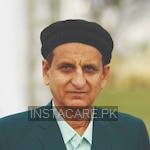Heat Stroke - Symptoms, Risk factors and Treatment
Last Updated On Saturday, February 28, 2026
Heat Stroke in Urdu
ہیٹ اسٹروک، جسے سن اسٹروک بھی کہا جاتا ہے، ایک ایسی حالت ہے جس میں آپ کا جسم گرمی کی طویل نمائش کی وجہ سے زیادہ گرم ہوجاتا ہے۔ یہ ایک ہنگامی حالت ہے جس میں فوری طبی علاج کی ضرورت ہے۔ عام طور پر، یہ 50 سال سے زیادہ عمر کے لوگوں کو متاثر کرتا ہے، لیکن یہ نوجوان کھلاڑیوں کو متاثر کر سکتا ہے۔
ہیٹ اسٹروک، اگر علاج نہ کیا جائے تو زیادہ گرمی کی وجہ سے آپ کے دماغ، گردے، عضلات اور دل جیسے اعضاء کو نقصان پہنچ سکتا ہے۔ یہ پٹھوں میں درد، چکر آنا اور تھکن سے شروع ہو سکتا ہے۔ جتنی دیر میں مریض کا علاج ہوتا ہے، اعضاء کے خراب ہونے کے امکانات بڑھ جاتے ہیں۔
Heat Stroke in English
Heatstroke, also known as sunstroke, is a condition in which your body overheats due to prolonged exposure to heat. It is an emergency condition that needs prompt medical treatment. Most commonly, it affects people over the age of 50, but it can affect young athletes.
Heatstroke, if left untreated, can damage your organs like the brain, kidneys, muscles, and heart due to excessive heat. It can start with muscle cramps, dizziness, and exhaustion. The later the patient gets treatment, the chances of organ damage increase.
Symptoms
The signs and symptoms of heatstroke are;
Raised body temperature- prolonged exposure to heat raises your body temperature to 104 degrees Fahrenheit. If it rises more, it can cause organ damage.
Changes in sweating- through sweating, your body cools down itself. But during heat stroke, it stops doing that, leaving your skin hot and dry upon touch.
Flushing- due to excessive heat, your skin can become red.
Rapid breathing- raised body temperature can make it difficult for you to breathe properly.
Increased heart rate- excessive heat can stress your heart to work more and more, resulting in increased heart rate.
Headache- heatstroke can cause a throbbing headache.
Other symptoms heatstroke may cause are;
- Nausea
- Vomiting
- Confusion
- Agitation
- Slurred speech
- Irritability
- Delirium
- Seizures
- Coma
Causes
Generally, heatstroke occurs due to two reasons.
Prolonged exposure to heat- long-term exposure to hot and humid weather, mostly on sunny days, can cause heatstroke. This kind of heatstroke is known as non-exertional or classic heatstroke. Mostly, it occurs in old aged people or the ones suffering from chronic illnesses.
Strenuous heatstroke- it is the type of heatstroke that occurs due to physical activity in the hot weather. Mostly, it occurs if the person is not used to high temperatures.
Other causes for heatstroke can be;
Wearing excessive and tight clothing in summers that do not let air pass through your clothes.
Drinking alcohol can alter your body temperature, eventually causing heatstroke.
Not drinking enough water can also provoke heat stroke as you may lose a lot of water content through sweating.
Risk Factors
The risk factors for heatstroke can be;
- Old age
- Physical activity in hot and humid weather
- Getting exposed to hot weather suddenly, when you travel different places
- Having a lack of air conditioning can turn the temperature cold and less humid.
- Taking drugs like beta-blockers, diuretic, antipsychotic, and antidepressant
- Being obese
- Having lung and heart diseases
Complications
Sunstroke can cause the following complications;
- Organ damage
- Death
Prevention
To prevent heatstroke, you can practice the following measures;
Wear clothes that are light and comfortable
Wear sunscreen while going out on a sunny day
Drink plenty of fluids, especially if you take diuretics
Do not sit in a parked car or let your child sit as it causes a rise of 20 degrees Fahrenheit even in 10 minutes.
Do not exercise on a hot sunny day, instead wait for the nighttime when the air becomes a bit cool. Also, drink plenty of water and replenish lost electrolytes.
Conclusion
Sunstroke, also known as heatstroke, is a condition in which your body overheats due to prolonged exposure to heat. It is an emergency condition that needs prompt medical treatment. Most commonly, it affects people over the age of 50, but it can affect young athletes. Heatstroke, if left untreated, can damage your organs like the brain, kidneys, muscles, and heart due to excessive heat.
Frequently Asked Questions
Heat stroke meaning in urdu is Loo لو .
The signs and symptoms of heat stroke include high body temperature, altered mental state or behavior, alteration in sweating, nausea and vomiting, flushed skin, rapid breathing, racing heart rate, and headache. Heat stroke is a life-threatening emergency and requires immediate medical attention.
During heat stroke, your body temperature rises to a dangerous level, usually 104 F (40 C) or higher. This condition can cause your brain, heart, kidneys, and muscles to become damaged, and can lead to serious complications or death if not treated quickly. Symptoms of heat stroke include high body temperature, altered mental state or behavior, alteration in sweating, nausea and vomiting, flushed skin, rapid breathing, racing heart rate, and headache. Seek immediate medical attention if you or someone you know is experiencing symptoms of heat stroke.









